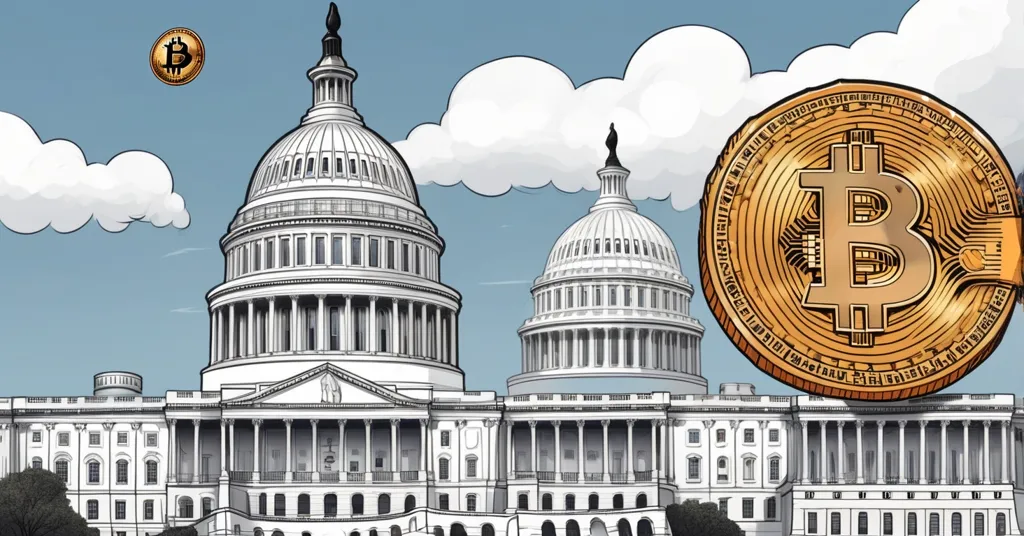BITCOIN Act Introduced to Tackle $36T US Debt with Crypto Reserve

BITCOIN Act: A Bold Move to Slash U.S. Debt with Digital Assets
Senator Cynthia Lummis (R-WY) has introduced the BITCOIN Act, a groundbreaking legislative proposal aimed at establishing a federal Bitcoin reserve to tackle the U.S.’s $36 trillion national debt and position the country as a leader in digital asset technology.
- Senator Lummis and Congressman Begich propose BITCOIN Act
- Aims to create federal Bitcoin reserve
- Supported by former President Trump
The BITCOIN Act, co-sponsored by Congressman Nick Begich (R-AK), was unveiled at the Bitcoin for America Summit. This initiative seeks to transform how the U.S. manages its financial obligations by leveraging Bitcoin’s potential. A Strategic Bitcoin Reserve, similar to traditional gold reserves, would be established to hold Bitcoin obtained through criminal or civil asset forfeiture. The U.S. government plans to maintain these assets as a store of reserve, without selling them, to address the national debt.
Senator Lummis is a staunch advocate for Bitcoin’s transformative power. “I’m particularly pleased with President Trump’s support of my Strategic Bitcoin Reserve initiative, which will address our national debt while securing America’s position as the global leader in financial innovation,” she stated. Lummis believes that widespread Bitcoin adoption could empower everyday workers and enhance global financial system security. “As Bitcoin comes into more usage, its use makes the whole system more secure, more robust, and more capable of serving our needs all over the world,” she explained.
Former President Trump’s endorsement adds significant weight to the proposal. In March, he signed an executive order to develop the Strategic Bitcoin Reserve, fulfilling his campaign promise to make the U.S. the “crypto capital of the world.” “I am very positive and open-minded to cryptocurrency companies, and all things related to this new and burgeoning industry. Our country must be the leader in the field,” Trump declared. This support signals a shift towards embracing digital assets in national policy.
However, the idea of using Bitcoin to address the national debt isn’t without its detractors. Critics point out Bitcoin’s notorious volatility as a potential risk. Can a federal Bitcoin reserve truly lead to financial stability when the cryptocurrency’s value can swing wildly? Some argue that the U.S. could be trading one financial risk for another. Yet, the promise of disrupting the status quo and championing decentralization remains a compelling argument for many in the crypto community.
The U.S. government’s plan to acquire Bitcoin involves using assets seized through forfeiture proceedings. The Secretaries of Treasury and Commerce will develop strategies to increase the reserve without burdening taxpayers. Additionally, a U.S. Digital Asset Stockpile will manage other digital assets obtained similarly, with the Treasury Secretary having the authority to manage and potentially sell these assets. This approach aims to optimize the handling of digital assets seized by various federal agencies.
The global implications of the BITCOIN Act and the Strategic Bitcoin Reserve are significant. By leading in digital asset management, the U.S. could influence other nations to adopt similar strategies, potentially reshaping the global financial landscape. However, public perception and Bitcoin adoption rates will play crucial roles in the success of these initiatives. While some may view this as a bold step towards financial innovation, others might see it as a risky gamble with the nation’s financial future.
As we navigate this uncharted territory, it’s essential to balance optimism with realism. Bitcoin and other cryptocurrencies promise to disrupt traditional financial systems, but they also face challenges such as regulatory hurdles and cybersecurity risks. The journey towards a decentralized financial future is fraught with both promise and peril, but with leaders like Lummis and initiatives like the BITCOIN Act, the U.S. is taking a bold step forward.
Key Questions and Takeaways
What is the BITCOIN Act?
The BITCOIN Act is proposed legislation aimed at creating a federal Bitcoin reserve to address the U.S. national debt and establish the country as a leader in digital asset technology.
Who proposed the BITCOIN Act?
The BITCOIN Act was proposed by Senator Cynthia Lummis (R-WY) and Congressman Nick Begich (R-AK).
How does the BITCOIN Act plan to address the U.S. national debt?
By establishing a federal Bitcoin reserve, which proponents believe will help manage the $36 trillion debt while positioning the U.S. as a leader in financial innovation.
What role does Donald Trump play in the Strategic Bitcoin Reserve initiative?
Donald Trump supports the initiative and signed an executive order in March to develop a Strategic Bitcoin Reserve, aligning with his campaign promise to make the U.S. the “crypto capital of the world.”
What is the current value of Bitcoin?
As of the latest data, Bitcoin is valued around $97,000.
“I’m particularly pleased with President Trump’s support of my Strategic Bitcoin Reserve initiative, which will address our national debt while securing America’s position as the global leader in financial innovation.” – Senator Cynthia Lummis
“As Bitcoin comes into more usage, its use makes the whole system more secure, more robust, and more capable of serving our needs all over the world.” – Senator Cynthia Lummis
“I am very positive and open-minded to cryptocurrency companies, and all things related to this new and burgeoning industry. Our country must be the leader in the field.” – Donald Trump



